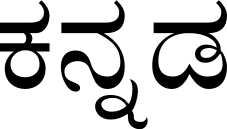Language/Kannada/Vocabulary/Idiomatic-Expressions
Hi Kannada learners! 😊
In this lesson, we will focus on idiomatic expressions in Kannada. Learning idioms will help you understand and communicate with native speakers more effectively, and will also give you insights into the culture and history of the Kannada-speaking regions.
With the completion of this lesson, consider investigating these related pages: Countries (deshagalu) & Greetings.
What are idiomatic expressions?[edit | edit source]
An idiom is a phrase whose meaning cannot be understood from the literal definitions of the individual words. Idioms in Kannada often reflect the cultural, historical and literary traditions of the language. For example, the idiom "ತುಂಟರಿಷ್ಟೆಯ ಹೊಳ್ಳೆಗೆ ಬಿದ್ದರೆ, ಹಾವುಗಳು ಬೇಕಾದಷ್ಟು ಹಿಂಬಾಲಿಸುತ್ತವೆ" (tuMTariShTe-ya hoLLegE biddare, hAvugaLu bEkAdaShTu hiMbaalisutteve) which translates to "if you fall into the well of lust, snakes will follow you," reflects the traditional Indian emphasis on self-control and morality, as well as superstitions about snakes. Similarly, the idiom "ಆಡು ಮೇಲಿದ್ದೆವು" (ADu melidde-ve) which literally means "we were riding a horse," is used to describe a situation where things were going well or you were on a winning streak.
Learning idioms will not only help you understand the language on a deeper level, but it will also make your conversations more interesting and engaging. So, let's get started!
Common idiomatic expressions in Kannada[edit | edit source]
Here are some commonly used idioms in Kannada:
| Kannada | Pronunciation | English |
|---|---|---|
| ನೀರಿನ ಕಡೆ ಹೋಗುವುದು | neerina kaDe hoguvudu | go to the water's edge (walking on thin ice) |
| ನೆಂಟಿದೆ ಕಳ್ಳ ಕೊಡವಿ | neMTide kaLLa koDavi | the thief has been caught red-handed (literally, the stolen goods have been found with him) |
| ನಾಯಿಯ ಕೈ ಕೆಲಸ | nAyiyA kai kelasa | giving a job to a dog (giving a task to someone who is unable to handle it properly) |
| ಕೋಪ ಗಾಂಬೀರ್ಯದ ಕಡೆಗೆ ಒಯ್ಯುವುದು | kOpa gAMbIryada kaDerege oyuvudu | anger leads to seriousness (usually said in a disapproving tone to someone who is getting too agitated) |
| ಕಬ್ಬಿಣ ಕಾಡಿಗೆ ಹೋದರೆ, ಮೃಗಗಳು ಸಂತೋಷದಿಂದ ತೆರೆಯುತ್ತವೆ | kabbina kADige hodare, mrigagaLu santOshadiMda tereyutteve | when you go to the forest with nuts, animals will come out to greet you (when you do something kind, good things will happen in return) |
Dialogue[edit | edit source]
Here's a dialogue to help you better understand how to use these idiomatic expressions:
- Person 1: ನನ್ನ ಹುಡುಗರು ಕ್ರಿಕೆಟ್ ಕೇಳುತ್ತಿದ್ದಾರೆ. (nanna huDuGaru kriket keLuttiddAru) (My kids are asking for cricket.)
- Person 2: ನೀರಿನ ಕಡೆ ಹೋಗೋ ನೀವು ಈಗ ಕ್ರಿಕೆಟ್ ಆಡುತ್ತಿದ್ದೀರಿ. (neerina kaDe hOgO nIvu Iga kriket ADuttiddIri) (You are walking on thin ice now, playing cricket with them.)
- Person 1: ನನ್ನ ಪ್ರಪಂಚದ ನಡುವೆ ಆ ಕಳ್ಳನನ್ನು ನೆಂಟಿಸಿರಿ. (nanna prapaMchada naDuve A kaLLananannu neMTisiri) (I have caught that thief in my world.)
- Person 2: ವಾಸ್ತವಿಕವಾಗಿ ನೀವು ನೆಂಟಿದ್ದೀರಿ ಅದನ್ನು ಕೊಡವಿಯಿಂದ. (vAstavyikavAgI nIvu neMTiddeera adannu koDaviyindA) (In reality, you caught him with the stolen goods.)
- Person 1: ಡಾಕ್ಟರ್ ನನ್ನನ್ನು ಹತ್ತಿರಕ್ಕೆ ಕರೆದಿದ್ದಾರೆ, ಆದರೆ ನಾನು ಅವನಿಗೆ ಗಮನವೇ ಕೊಡಲಿಲ್ಲ. (DakTar nannannu hattirakke karedidde, Adare nAnu avanige gamanavE kodalilla) (The doctor gave me a task, but I didn't pay attention to him.)
- Person 2: ನಾಯಿಯ ಕೈ ಕೆಲಸ, ನೀವು ಅಲ್ಲಿಗೆ ಚಲಿಸಲು ಇಷ್ಟಪಡುತ್ತೀರಿ ಆದರೆ ಅದು ಹೇಗೆ ಸಾಧ್ಯ? (nAyiyA kai kelasa, nIvu alligE chalisalu iShTabadutteera Adare adu hege sAdhya?) (You are giving a job to a dog. You may like to go there, but how is it possible?)
Conclusion[edit | edit source]
Learning idiomatic expressions in Kannada is a fun and effective way to deepen your understanding of the language and culture. In addition, it will make your conversations more engaging and interesting. Use the examples above to practice using idioms, and remember to speak with native speakers as much as possible. To improve your Kannada Vocabulary, you can also use the Polyglot Club website. Find native speakers and ask them any questions!
➡ If you have any questions, please ask them in the comments section below.
➡ Feel free to edit this wiki page if you think it can be improved. 😎
Well done on mastering this lesson! Don't miss these related pages to expand your knowledge: Food & Introductions.
Videos[edit | edit source]
Idioms and phrases in English (in kannada explanation) - YouTube[edit | edit source]
Other Lessons[edit | edit source]
- How to say Good Bye?
- Colors
- Languages (bhashegalu)
- Animals
- Feelings and Emotions
- Days of the Week
- Resources
- Food
- Health
Sources[edit | edit source]
- Kannada Vocabulary - Idiomatic expressions
- English To Kannada Dictionary Java - biergartenbaycity.com
- English English Kannada Dictionary - Cgeprginia

